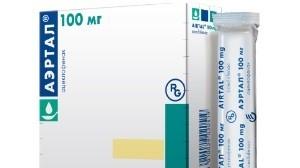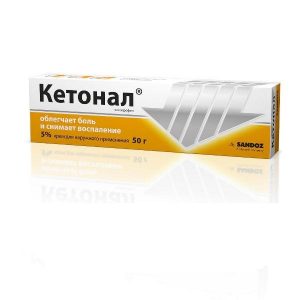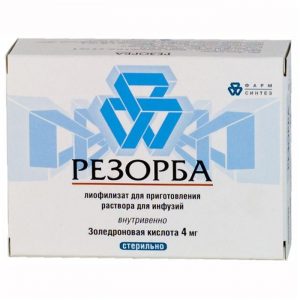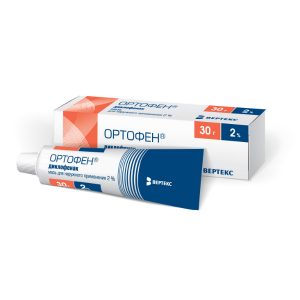Description
Release form
Aertal powder for oral suspension.
Packaging
20 bags.
Pharmacological action of
Aceclofenac is an NSAID that has anti-inflammatory and analgesic effects. The mechanism of its action is based on the inhibition of prostaglandin synthesis.
In rheumatic diseases, the anti-inflammatory and ayalgesic effects of aceclofenac significantly reduce the severity of pain, morning stiffness, swelling of the joints, which improves the patient’s functional state.
Indications
– symptomatic treatment of rheumatoid arthritis
– osteoarthritis
– ankylosing spondylitis
– for relief of inflammation and pain with lumbago
– toothache
– rheumatoid arthritis.
The drug Aertal is intended for symptomatic therapy, reducing pain and inflammation at the time of use, does not affect the regression of the disease.
Contraindications
– erosive and ulcerative lesions of the gastrointestinal tract in the exacerbation phase (including ulcerative colitis, Crohn’s disease)
– gastrointestinal bleeding or suspected
– complete or incomplete combination of bronchial asthma, recurrent obstruction and polyposis and intolerance to acetylsalicylic acid or other NSAIDs (including a history)
– hypersensitivity to aceclofenac or components of the drug Aertal
– severe liver failure or active liver disease
– disorders to ovetvoreniya and coagulation
– severe renal failure (creatinine clearance <30 mL / min) progressive kidney disease, confirmed hyperkalemia – severe heart failure – period after coronary artery bypass grafting – pregnancy and lactation – children under 18 years old: – fructose intolerance – feinleketonuria. Precautions: Chronic heart failure, coronary heart disease, arterial hypertension, decreased circulating blood volume (including the condition after extensive surgery), cerebrovascular disease, peripheral artery disease, chronic renal failure (creatinine clearance less than 60 ml / min ), liver failure, history of liver, kidney and gastrointestinal diseases, history of ulcerative colitis, history of Crohn’s disease, bronchial asthma, dyspeptic symptoms at the time of administration I’m a drug anamnestic data on the development of gastrointestinal ulcer, the presence of Helicobacter pylori infection, diabetes mellitus, dyslipidemia / hyperlipidemia, old age, smoking, prolonged use of NSAIDs, the use of systemic glucocorticosteroids, anticoagulants, antiplatelet agents, serotonin reuptake inhibitors, alcoholic diseases, diuretics , hematological diseases, hematopoiesis, systemic lupus erythematosus (SLE), porphyria, chicken pox. Use during pregnancy and lactation Pregnancy: Aertal® is contraindicated in pregnancy. Information on the use of aceclofenac during pregnancy is not available. Inhibition of prostaglandin synthesis may adversely affect pregnancy and / or embryo / fetal development. During the third trimester of pregnancy, all prostaglandin synthesis inhibitors: – having cardiopulmonary toxicity, can cause premature closure of the Botallus duct with the development of pulmonary hypertension – can cause fetal kidney function impairment, which can progress to renal failure in combination with oligohydramnios. Mothers in late pregnancy and newborns: – the drug can affect the duration of bleeding due to the antiplatelet effect that can develop even after very low doses of are used – the drug can suppress uterine contractions, resulting in delayed delivery or prolonged labor. Lactation: Aertal® should not be taken during breastfeeding. There are no data on the excretion of aceclofenac with human milk when the administration of radioactive 14C-aceclofenac to lactating rats did not significantly transfer radioactivity into milk. Fertility: NSAIDs can affect fertility and are not recommended for women planning a pregnancy. Special instructions Avoid the use of the drug AertalВ® simultaneously with other NSAIDs, including selective cyclooxygenase-2 inhibitors. Adverse events can be reduced by minimizing the duration of treatment and reducing the dose to the minimum necessary to achieve control of the symptoms of the disease. Effect on the digestive tract. Aceclofenac should be prescribed with caution and under close medical supervision to patients with the diseases listed below, as their course may worsen: – symptoms indicating gastrointestinal diseases, including upper and lower gastrointestinal tract – ulcer, bleeding or perforation of an ulcer history of a stomach or intestines in the presence of Helicobacter pylori infection – ulcerative colitis in the history of – Crohn’s disease in the history of – hematologic diseases, systemic lupus erythematosus (SLE), porphyria and disorders of the cr fulfillment. There are reports of gastrointestinal bleeding, ulceration of the stomach or intestines, or perforation of the ulcer, which can lead to death when taking any NSAIDs at any time during treatment, with or without alarming symptoms, regardless of the history of serious gastrointestinal complications. The risk of gastrointestinal bleeding, ulcer formation, or perforation of the ulcer is higher when treating with high doses of NSAIDs in patients with a history of stomach or intestinal ulcers, especially if it is complicated by bleeding or perforation, as well as in elderly patients. Treatment of these patients should begin with the lowest effective dose. Also in the treatment of these groups of patients and patients who require the simultaneous use of acetylsalicylic acid in small doses or other drugs, which may increase the risk of gastrointestinal complications, consideration should be given to the use of combination therapy with protective drugs (for example, misoprostol or proton pump inhibitors). Patients with a history of gastrointestinal disease, especially the elderly, should report any unusual symptoms in the abdomen (especially gastrointestinal bleeding), paying maximum attention to the symptoms in the early stages of treatment. Caution must be exercised in the treatment of patients receiving concomitant medications that may increase the risk of ulcers or bleeding, such as systemic glucocorticosteroids, anticoagulants, such as warfarin, selective serotonin reuptake inhibitors, or antiplatelet drugs. such as acetylsalicylic acid. In case of gastrointestinal bleeding or ulceration in patients taking AertalВ®, treatment should be discontinued. Effect on the cardiovascular system and blood circulation of the brain. In the treatment of patients with arterial hypertension and / or chronic heart failure, appropriate monitoring and recommendations should be made, as there are reports of the development of fluid retention and edema during treatment with NSAIDs. There is reason to believe that some NSAIDs (especially in high doses and with long-term treatment) may increase the risk of developing arterial thrombotic complications (for example, myocardial infarction or stroke). To exclude this risk with the use of aceclofenac, insufficient data. Patients with uncontrolled arterial hypertension, congestive heart failure, established coronary heart disease, peripheral arterial disease and / or cerebrovascular disease should only begin treatment with aceclofenac after a informed decision by the attending physician. Likewise, a thorough assessment of the indications for long-term treatment of patients with risk factors for cardiovascular disease (for example, arterial hypertension, hyperlipidemia, diabetes mellitus and smoking) before it begins is necessary. Caution should also be exercised and careful medical supervision should be given when using aceclofenac in patients with a history of cerebral hemorrhage. Effect on the liver and kidneys. NSAID treatment may cause a dose-dependent decrease in prostaglandin synthesis and cause renal failure. The importance of prostaglandins for maintaining renal blood flow in patients with impaired cardiac or renal function, liver dysfunction, patients receiving treatment with diuretics or recovering from abdominal surgery, as well as elderly patients, must be taken into account. Caution should be exercised in treating patients with impaired liver or kidney function, as well as patients with other diseases predisposing to fluid retention. In these patients, treatment with NSAIDs can lead to impaired renal function and fluid retention in the body. It is also necessary to be careful when using the drug for patients receiving treatment with diuretics, or, conversely, to patients at risk of hypovolemia. A minimum effective dose should be prescribed and regular monitoring of renal function should be carried out. The effect of the drug on kidney function is usually reversible after aceclofenac is discontinued. Aceclofenac treatment should be discontinued if deviations of the liver function tests from normal values ​​persist or increase with the appearance of clinical symptoms corresponding to the development of liver failure, or in the case of other manifestations (for example, eosinophilia, rash). Hepatitis may develop without previous symptoms. In patients with hepatic porphyria, the use of NSAIDs can trigger an exacerbation of the disease. Hypersensitivity and skin reactions. As with other NSAIDs, allergic reactions may appear in the early stages of the drug’s use, including ayaphylactic / anaphylactoid reactions. In very rare cases, against the background of NSAIDs, serious skin reactions were observed, including exfoliative dermatitis, Stevens-Johnson syndrome and toxic epidermal necrolysis, some of which can lead to death. Patients are at the highest risk of developing these reactions at the beginning of the course of treatment, in most cases the reactions manifest in the first month of treatment. At the first signs of a skin rash, damage to the mucous membranes, or any other symptoms of hypersensitivity, treatment with AertalВ® should be discontinued. In extremely rare cases, chickenpox can cause serious infectious complications from the skin and soft tissues. At present, the role of NSAIDs in worsening the course of these infectious complications cannot be ruled out. Consequently, AertalВ® is recommended to be avoided in case of chickenpox. Effect on hematological parameters. Aceclofenac may reversibly inhibit platelet aggregation. Disorders of the respiratory system. Caution must be exercised when using the drug in patients with bronchial asthma or with a history of bronchial asthma, as there are reports that NSAIDs can cause bronchospasm in such patients. Elderly patients. Caution should be exercised in the treatment of elderly patients, since in this age group the frequency of adverse events associated with the treatment of NSAIDs is increased, especially gastrointestinal bleeding and perforation of ulcers, which can lead to death. In addition, elderly patients are more prone to renal, liver or cardiovascular failure. Long-term treatment. It is necessary to carefully observe all patients receiving long-term NSAID treatment, regularly performing a general blood test, and functional tests of the liver and kidneys. Each sachet of AertalВ®, a powder for oral suspension, 100 mg, contains 2.64 g of sorbitol, which can cause gastrointestinal disorders and diarrhea. Patients with rare hereditary fructose intolerance should not be prescribed this drug. contains 2.64 g of sorbitol, which can cause gastrointestinal disorders and diarrhea. Patients with rare hereditary fructose intolerance should not be prescribed this drug. contains 2.64 g of sorbitol, which can cause gastrointestinal disorders and diarrhea. Patients with rare hereditary fructose intolerance should not be prescribed this drug.t. AertalВ®, powder for oral suspension, 100 mg, contains aspartame, a source of phenylalanine. Patients with phenylketonuria should consider that each sachet contains 5.61 mg of phenylalanine. Influence on the ability to drive vehicles and work with mechanisms. You should refrain from driving vehicles and engaging in other potentially dangerous activities that require an increased concentration of attention and speed of psychomotor reactions, since the drug can cause dizziness and other side effects that can affect these abilities. Composition 1 pack: – aceclofenac 100 mg Excipients: sorbitol – 2.639 g, sodium saccharin – 0.01 g, aspartame – 0.01 g, colloidal silicon dioxide – 0.006 g, hypromellose – 0.018 g, titanium dioxide – 0.012 g, milk flavor – 0.1 g, caramel flavor – 0.05 g, cream flavor – 0.05 g Dosage and administration The contents of the sachets should be dissolved in 40-60 ml of water and taken immediately. Simultaneous intake of writing slows down the absorption rate of the active substance, but does not reduce the degree of absorption from the digestive tract. Adults: The recommended dose of Aertal is 1 sachet 2 times a day (one in the morning and one in the evening). Children: The safety and effectiveness of the drug in the treatment of children and adolescents has not been established. Elderly patients: Usually, a dose reduction is not required, but the precautions given in the “Special Instructions” section should be taken into account. Hepatic insufficiency: In the treatment of patients with impaired liver function of mild to moderate severity, lower doses of aceclofenac should be used. The recommended starting dose is 100 mg per day. Renal failure: Evidence of the need to change the dose of aceclofenac in the treatment of patients with impaired renal function of mild to moderate severity, but caution is advised. Adverse events can be minimized by reducing the duration of treatment to the minimum necessary to achieve control of the symptoms of the disease. Side effects The following are adverse events, information about which was obtained in clinical trials and during post-marketing observation, adverse events are grouped in accordance with the classes of organ systems according to the Medical Dictionary for Regulatory Activities (MedDRA) and the frequency of occurrence. Very often (? 1/10) often (from? 1/100 to <1/10) infrequently (from? 1/1000 to <1/100), rarely (from? 1/10000 to <1/1000), very rarely (<1/10000). – Disorders of the blood and lymphatic system Rarely: anemia. Very rare: bone marrow suppression, granulocytopenia, thrombocytopenia, neutropenia, hemolytic anemia. – Immune system disorders Rarely: anaphylactic reactions (including shock), hypersensitivity. – metabolic and nutritional disorders Very rare: hyperkalemia. – Mental disorders Very rare: depression, unusual dreams, insomnia. – Disorders of the nervous system Often: dizziness. Very rarely: paresthesia, tremors, drowsiness, headache, dysgeusia (taste perversion). – Visual Disorders Rarely: visual impairment. – Hearing impairment and labyrinthine disorders Very rare: dizziness, ringing in the ears. – Heart Disorders Rarely: heart failure. Very rare: palpitations. – Vascular disorders Rarely: increased blood pressure, worsening of hypertension. Very rarely: hyperemia, flushing, vasculitis. – Disorders of the respiratory system, chest aunts and mediastinum Rarely: shortness of breath. Very rare: bronchospasm. – Gastrointestinal Disorders Often: dyspepsia, abdominal pain, nausea, diarrhea. Infrequently: flatulence, gastritis, constipation, vomiting, ulcerative stomatitis. Rarely: melena, formation of ulcers of the stomach and intestines, hemorrhagic diarrhea, gastrointestinal bleeding. Very rare: stomatitis, vomiting of blood, perforation of the intestines, exacerbation of Crohn’s disease and ulcerative colitis, pancreatitis. – Disorders of the liver and biliary tract Often: increased activity of liver enzymes. Very rare: liver disease (including hepatitis), increased alkaline phosphatase activity. – Disorders of the skin and subcutaneous tissue Infrequently: itching, rash, dermatitis, urticaria. Rarely: Quincke’s edema. Very rare: purpura, eczema, severe mucocutaneous reactions (including Stevens-Johnson syndrome and toxic epidermal necrolysis). – Disorders of the kidneys and urinary tract Infrequently: increased serum urea concentration, increased serum creatinine concentration. Very rare: nephrotic syndrome, renal failure. – General disorders and disorders at the injection site Very rare: swelling, weakness, muscle cramps. – Changes to laboratory and instrumental studies Very rare: weight gain. Drug Interactions No drug interaction studies have been performed, with the exception of warfarin interaction studies. Aceclofenac is metabolized in the P450 2C9 system and, according to in vitro studies, it can inhibit this isoenzyme. Therefore, there is a risk of pharmacokinetic interaction with phenytoin, cimetidine, tolbutamide, phenylbutazone, amiodarone, miconazole and sulfafenazole. As with other NSAID drugs, there is also a risk of pharmacokinetic interactions with other drugs that are actively excreted by the kidneys, such as methotrexate and lithium. Aceclofenac binds almost completely to blood plasma proteins, therefore, there is a likelihood of interaction with other drugs with high affinity for blood plasma proteins, according to the type of substitution, which should be taken into account. Since studies of pharmacokinetic interactions are insufficient, the information below is based on data obtained for other NSAIDs: The following drug combinations should be avoided: Lithium and digoxin: some NSAIDs inhibit renal clearance of lithium and digoxin, which leads to an increase in the concentration of these drugs in serum. This combination of drugs should be avoided unless when frequent monitoring of lithium and digoxin levels is possible. Anticoagulants: NSAIDs inhibit platelet aggregation and damage the gastrointestinal mucosa, which can increase anticoagulant activity and increase the risk of gastrointestinal bleeding in patients taking anticoagulants. The use of a combination of aceclofenac and coumarin anticoagulants for oral administration, ticlopidine, thrombolytic drugs and heparin should be avoided, unless careful monitoring is performed. Antiplatelet agents and selective serotonin reuptake inhibitors in combination with NSAIDs may increase the risk of gastrointestinal bleeding. The following drug combinations may require dose adjustment and caution: Methotrexate: NSAIDs inhibit tubular secretion of methotrexate, therefore, the possible interactions between NSAIDs and methotrexate should also be considered in the treatment of low doses of methotrexate, especially in patients with renal failure. In cases where it is necessary to use combined treatment, kidney function should be monitored. Caution must be exercised in cases where both NSAIDs and methotrexate are administered together within 24 hours, since the concentration of methotrexate may increase, which will lead to an increase in its toxicity. Cyclosporine, tacrolimus: concomitant use of NSAIDs and cyclosporine or tacrolimus is believed to increase the risk of renal toxicity due to decreased synthesis of prostacyclin by the kidneys. Therefore, it is very important to carefully monitor kidney function during combination treatment. Other NSAIDs: the simultaneous use of acetylsalicylic acid and other NSAIDs can increase the frequency of adverse events, so caution should be exercised. Glucocorticosteroids: May increase the risk of gastrointestinal ulcers or gastrointestinal bleeding. Diuretics: aceclofenac, like other NSAIDs, can inhibit the activity of diuretics, reduce the diuretic effect of furosemide, bumetanide and the antihypertensive effect of thiazides. Simultaneous treatment with potassium-sparing diuretics may be associated with an increase in potassium, therefore, it is necessary to control the potassium content in the blood serum. Aceclofenac has been shown to not affect blood pressure control when used simultaneously with bendrofluazide, although drug interactions with other diuretics cannot be ruled out. Antihypertensives: NSAIDs may also decrease the effectiveness of certain antihypertensive drugs. ACE inhibitors or angiotensin II receptor antagonists in combination with NSAIDs can lead to impaired renal function. Some patients with impaired renal function, such as elderly patients or patients with dehydration, may be at risk of developing acute renal failure, which is usually reversible. Therefore, caution must be exercised in the combined use of these drugs with NSAIDs, especially in the treatment of elderly patients or patients with dehydration. Patients should be hydrated sufficiently, in addition, it is recommended to take into account the need to monitor renal function after the start of combined treatment, as well as periodically during treatment. has been shown that aceclofenac does not affect blood pressure control when administered simultaneously with bendrofluazide, despite the fact that interactions with other diuretics cannot be ruled out. Hypoglycemic drugs: in clinical studies it was shown that diclofenac can be used simultaneously with hypoglycemic drugs for oral administration, without affecting their clinical effectiveness. However, there are separate reports of the hypoglycemic and hyperglycemic effect of this drug. Therefore, regarding aceclofenac, the possibility of dose adjustment of drugs that can cause hypoglycemia should be considered. Zidovudine: with the simultaneous use of NSAIDs and zidovudine, the risk of hematological toxicity increases. There is evidence of an increased risk of hemarthrosis and hematomas in HIV-positive patients, suffering from hemophilia, and receiving concomitant treatment with zidovudine and ibuprofen. Overdose There is no evidence of an overdose of aceclofenac in humans. Possible symptoms: nausea, vomiting, stomach pain, dizziness, headache, hyperventilation phenomena with increased convulsive readiness. Treatment: gastric lavage, administration of activated charcoal, symptomatic therapy. Forced diuresis, hemodialysis is not effective enough. Active ingredient Aceclofenac pharmacy terms for prescription Form of Treatment simply entails dlya accepts vnutry Appointment Adult prescription, For athletes Possible product names AERTAL 100MG. 3G. PACKAGE No. 20 POR. D / PRIG. SUSP. D / RECEPTION INSIDE PACK. Aertal sachets 3 g, 20 pcs. AERTHAL POR. D / PRIG. SUSP. D / IN. NOTE 100MG, PACKAGE 3G № 20 AERTAL POR. D / SUSP.INTERN. 100MG No.20




